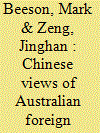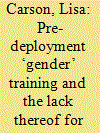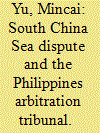|
|
|
Sort Order |
|
|
|
Items / Page
|
|
|
|
|
|
|
| Srl | Item |
| 1 |
ID:
144319


|
|
|
|
|
| Summary/Abstract |
While power asymmetry typically defines security relationships between allies, there exist other forms of asymmetry that influence alliance politics. In order to illustrate how they can shape policy outcomes that cannot be explained solely through the lens of power capabilities, the authors examine the role of relative attention that each side pays to the alliance. It is their central argument that since the client state has a greater vested interest in the alliance and given that attention depends on interest/need, the client state can leverage attention to get its way. By analysing two specific cases, the 2002 South Korean schoolgirls tragedy and the 2008 beef protests—instances where the South Koreans succeeded in compelling US concessions—the authors show that because the alliance was more central to the client state's agendas, there existed an asymmetry of attention that offered leveraging opportunities for the weaker ally. In this study, the authors emphasise the role of media attention as a key variable, and seek to contribute to debates on weaker party leverage in asymmetrical alliances.
|
|
|
|
|
|
|
|
|
|
|
|
|
|
|
|
| 2 |
ID:
144323


|
|
|
|
|
| Summary/Abstract |
The economic importance and strategic significance of Australia's relationship with China means that bilateral ties have become a major focus of attention in the scholarly and policymaking communities in Australia. Understandably enough perhaps, less attention has been given to the way the relationship is understood in China. This article addresses this absence in the literature by providing an overview of some of the more important contributions to the discussion in China. The most important point that emerges from such an analysis is that there is an ‘asymmetry of interest’ in the two countries, with Australia occupying a far less prominent place in Chinese policy discussions than China does in Australia. Equally noteworthy is the fact that the study of Sino-Australian relations in China is characterised by a greater variety of perspectives than it is in Australia. Appreciating this diversity is an essential part of developing a more accurate understanding of the policymaking milieu in China.
|
|
|
|
|
|
|
|
|
|
|
|
|
|
|
|
| 3 |
ID:
144320


|
|
|
|
|
| Summary/Abstract |
The governance of Antarctica has re-emerged as a geopolitical issue in the past decade due to the increased presence of China, India and Russia; the continent's importance in understanding global climate change; and its economic potential as a source of marine, genetic and mineral resources. This article examines the challenges for the Antarctic Treaty System (ATS) in this context and the consequences for Australia's foreign policy in its dual role as both a territorial claimant and supporter of ATS norms of cooperative science and environmental protection. The central argument is that Antarctic ‘bifocalism’ is under pressure as increased commercial activity and problematic jurisdictional interfaces with other regimes create difficult regulatory challenges for the ATS and encourage assertions of sovereignty that cannot be resolved within the existing regime. Consequently, the author argues that it is vitally important for Australia to preserve the legitimacy of the ATS through a policy framework of ‘strategic denial’ that aims to prevent all states from acquiring sovereignty over Antarctic territory. Australia should therefore reject recent proposals to securitise Antarctic policy or pursue World Heritage listing because they involve assertions of sovereignty that risk fracturing the ATS and thus compromise Australia's enduring interest in keeping Antarctica as ‘a continent of international cooperation and peace’.
|
|
|
|
|
|
|
|
|
|
|
|
|
|
|
|
| 4 |
ID:
144324


|
|
|
|
|
| Summary/Abstract |
Implementing sustainable community safety and security sector reform (SSR) in highly unstable and conflict-affected contexts is a significant and growing challenge. Donor-led SSR processes claim to enable transparent, effective and accountable provision of security. Yet, traditional, externally driven SSR processes implemented in a top-down manner have been shown to have important shortcomings. Using the experience of a form of SSR undertaken in the Jenin Governorate in the Palestinian territories, this article highlights some of these shortcomings—in particular, a lack of local ownership, failure to address governance issues, co-optation of political and security elites, and neglect of citizens’ views and needs—as well as describing a viable method for overcoming them to produce a more sustainable approach to community safety in extremely difficult circumstances through the use of outcome-based local crime prevention planning processes. In contrast, the Jenin community safety project was a bottom-up, community-based approach that built effective ‘partnerships’ for crime prevention with both formal security providers (for example, security forces, executive authorities, parliamentarians and governors’ offices) and informal security providers (for example, civil society, the media, and tribal and business leaders) to produce a viable mechanism by which a safer community with stronger local leadership might be created.
|
|
|
|
|
|
|
|
|
|
|
|
|
|
|
|
| 5 |
ID:
144321


|
|
|
|
|
| Summary/Abstract |
In the area of peacekeeping training, Australia has a reputation of promoting ‘best practice’ internationally. Training for Australian police peacekeepers has been described by the United Nations as ‘one-of-a-kind’ and ‘a world-class model of best practice’. This article provides a case study of how gender training is conducted, and how ‘gender’ is understood from a critical feminist perspective. This article focuses only on the pre-deployment training stage and is informed by confidential interviews with staff from the Australian Federal Police and the Australian Defence Force, as well as observing training in 2013–14. The findings suggest that the training is inadequate because it is not carried out for all peacekeeping personnel, despite international and national requirements to do so. In addition, the findings suggest that ‘gender’ is understood in a very limited way that does not problematise power relations between the sexes and is only covered as a way of understanding the peacekeeping context, and not in relation to the attitudes and behaviours of peacekeepers themselves. This raises the question of whether and how other troop-contributing countries conduct the training and to what standard, given the documented problems of Australia's supposedly ‘best-practice’ training.
|
|
|
|
|
|
|
|
|
|
|
|
|
|
|
|
| 6 |
ID:
144318


|
|
|
|
|
| Summary/Abstract |
The Philippines Arbitration Tribunal separately dealing with the jurisdiction over the South China Sea dispute is the continuance of the set practice by the United Nations Convention on the Law of the Sea's Annex VII arbitral tribunals of bifurcation of proceedings, and was the best option for it to deal with China's objections to its jurisdiction in the circumstance of China's non-acceptance of and non-participation in the arbitral proceedings. Such a measure has potentially important implications for the tribunal itself and for China. The tribunal's decision to have jurisdiction over some parts of the Philippines’ submissions resumed the merits proceedings of the dispute. This development of the proceedings would force China to reconsider its current policy of non-participation. Participation in the subsequent merits proceedings might be the right choice for China.
|
|
|
|
|
|
|
|
|
|
|
|
|
|
|
|
|
|
|
|
|